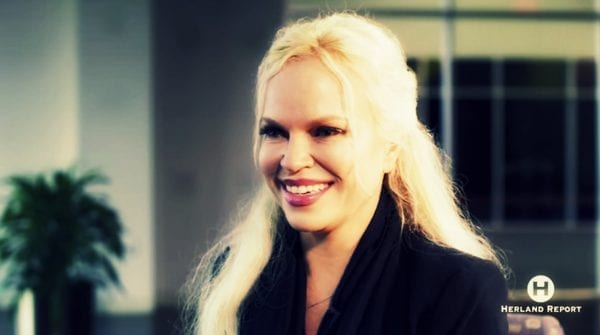In The Protestant Ethic and the Spirit of Capitalism, sociologist Max Weber states that when modern Capitalism took form in Protestant countries such as Switzerland and Germany about two hundred years ago, the ideal was to earn money and increase wealth – not to squander one’s income away on status, luxury and consumerism.
The duty of the believer was to use their abilities to achieve success in all aspects of life, in order to honor God and help their fellow man.
This thought is also deeply embedded in Jewish thinking, from which Christianity derives its roots, writes historian of comparative religions and bestselling author, Hanne Nabintu Herland, founder of The Herland Report.
The created world is viewed as imperfect, and it is the duty of the human being to use his life to make it better. Some become musicians, some intellectuals, some scientists, some skilled workers, some excellent teachers, and nannies. Jewish tradition keeps this ideal very alive; each man is to strive to become the best version of himself, to “help God” make the world a better place with whichever abilities he has.
Christianity addresses the same topic, speaking of capital and finances as a means to build society and do good to others. One is to earn money in order to have something to give to society for the betterment of all.
The initial form of Protestant Capitalism had solidarity at its core. Yet, in the West today, a Capitalism devoid of morality has become the means to justify greed, injustice, and selfishness.

The Protestant Ethic and Capitalism: In the early Protestant countries, the point was to reinvest capital into the economic system and make sure the whole society prospered. The contingent culture of sincerity that Protestantism represented at that time emphasized pietistic, frugal attitudes combined with income-producing hard work. Solidarity was front and center, at the very core of the early Capitalists.
One of the economic model’s brilliant principles was the association between saving and innovation. The possibilities that lie in the individualistic approach of owning the fruit of one’s own labor contributed to the break with pre-industrial society and its fixed focus on hereditary titles and vocations.
New opportunities were abundant. In the USA, immigrants from Britain who were farmers and fishermen increased their status by harnessing their own expertise, willingness to work side by side in the fellowship of men, founded on virtues and ethical qualities.
RELATED ARTICLES:
- Paul Craig Roberts: Important book about Gangster State Capitalism and Returning Feudalism – by Hanne Herland “New Left Tyranny”
- Alan Greenspan and Economic Ethics: We cannot build the economy without an ethical foundation
- The Age of Western Stagnation: Greed and Lack of Trust
- The Billionaire Capitalism of today is a total Perversion of the Historic Capitalism that brought millions out of poverty
- Christian Values formed Western Civilization: Equality, individualism, empathy, human dignity
- Exclusive interview with John Whitehead: Surveillance Capitalism and the End of Democracy
The Protestant Ethic and Capitalism: By virtue of hard work and industry, many who came from the lower classes in England became wealthy landowners in the New World. Poor Puritans from Germany, became the large landowners of Brazil, creating industries, plantations and stimulating trade that to this day fuel the economy of South America’s largest country.
In Fixing Fragile States, author Seth Kaplan underlines how decisive the elements of Christian thought have been for the growth of stability in the West. These are the precise cultural roots that now are ignored as Western culture has undergone a cultural revolution that rejects Judeo-Christian values and looks to the extreme liberal, non-religious society to bring sustainable solutions.
Kaplan states that both humanism and the idea of equality have their origin in Christian ideology. Man is to not only think about himself and acquire wealth “only to his own benefit,” but he is to work for the betterment of society as a whole – he is to “love his neighbor.”
The social ethic that formed the foundation of the Capitalist economic model aimed to develop society through a structure that encouraged individualism and the right of the worker to own the profit of his own labor. In addition, Protestantism attached great weight on education. People were to learn to read and write so that they could read the Holy Scriptures.
This served to increase literacy, book publishing, and printing, as well as the growth of active journalism. People became much more knowledge-oriented – which again is an idealized necessity in democracies.
Pope John Paul II once said that one of the fundamental principles of modern Capitalism is dissatisfaction, not being satisfied with what you already have. This dissatisfaction is a two-edged sword: if used correctly to the betterment of society, it becomes constructive. If used to legitimize egoism, it produces a negation of its original intent.
The Protestant Ethic and Capitalism: Max Weber also demonstrated in his work the close relationship between religious ethic and the growth of constructive Capitalism. Its ability to motivate people to work hard leading to the growth of a disciplined working class, where the ideal was to use the stream of capital to re-invest in new businesses which again created new jobs for even more people.
The result was a remarkable creation of a value-added system that differed completely with the previous generation’s economic system. The religious influence of the Protestant Pietists and their attitudes fuelled a holistic approach to money that ended upbringing prosperity to millions and millions in the West.
To achieve success was considered a sign of God’s favor, a means through which one should do even more good. Early Protestants, such as Calvinists, Quakers, and other independent denominations, all urged an individualization of faith that made the individual responsible for their own moral; wealth and spiritual growth. It was not the “relativistic individualization” we see today, where individualism is used to legitimize a person’s right to selfish behavior and disentanglement from the fellowship of men.
These Christians had strict moral standards – they were harsh – and demanded honesty and integrity of their political leaders.
Kaplan claims that especially the above-mentioned strict Christian attitudes produced closely knit groups with high moral standards that demanded an ethical lifestyle based on the Ten Commandments. You could trust a man to keep his promise. If he failed to keep his word, the punishment was severe.
Fear of these consequences kept many within prescribed limits. It is hard to build well-functioning societies without well-functioning institutions based on a justice system that works to the benefit of the citizens. The advantage of a society centered on consequences was that cooperation and trust also formed the basis for trade, business, and investment.
As mentioned earlier, in the ancient Greek democracies, political leaders who failed to serve the people also experienced dire consequences. This kept “the elite” on their guard. Some faced capital punishment, others sent into permanent exile.
Those who wanted the privileges of political leadership were also forced to take the responsibility. To become a political leader in the ancient city states, meant putting your life on the line in case you failed.
A number of countries outside the Western hemisphere today successfully implement a well-functioning Capitalism that continues to stress the strict moral significance of hard work, individualism, personal property rights. Today, millions of people embark on the same journey out of poverty, especially in Southeast Asian states.
Ironically, they seem to want the technological advancement in order to grow economically and become prosperous nations based on a strong work ethic and discipline, yet do not want to implement Western values and ideologies such as the current hedonism, anti-religious culture, and nihilist morality. South Korea now sports one of the world’s most expansive economies, with a substantial increase in prosperity over the last fifty years, 67% of the population rated as middle class, according to Hyundai Economic Research Institute.
The Asian nations implement the industrial, technological, educational advancements that historically stem from the Western achievements. Take Communist China, which has implemented a strong market Capitalism, yet still been very cautious to avoid following what they perceive to be decadent Western values. China regularly bans certain songs from the Western music industry and shuts down pornographic internet pages with unwanted and violent content, as seen massively in 2016. They emphasize marriage and family values, modesty and a culture of politeness in accordance with traditional Asian ideals.
The Protestant Ethic and Capitalism: According to a study by McKinsey & Company over 550 million Chinese will be rated middle class in China alone by 2022, according to Business Insider. This is more than the total European population. According to OECD numbers, Asia will in 2030 represent 66% of the global middle-class population and 59% of middle-class consumption, compared to 28% and 23%, respectively in 2009.
Where would the West be without the Christian ethic and its respect for hard work, honesty, reliability, trustworthiness, saving and not only spending money? How would the traditionalist West have looked if individuals did not invest capital into new projects in order to create jobs for even more people, engaged in paying one’s taxes for the benefit of society?
When political leaders become selfishly preoccupied with tending to their own benefits alone, solidarity crumbles and only the very few benefit.









